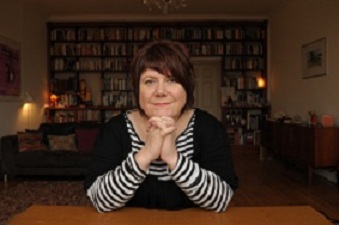Cocooned in the comfy seating of the dimly lit Belmont Filmhouse, Aberdeen, the audience settles, keen to enjoy another in the popular Culture Café series of lunchtime events. This month it’s the turn of multi-award winning, psychological thriller writer, Louise Welsh, who is introduced by the prize-winning poet and fiction author, Alan Spence. They have much in common. Spence, Emeritus Professor of Creative Writing at Aberdeen University, now owns a bookshop. Welsh, who reveals she began her career as a second hand bookshop proprietor with the princely sum of £300, is now a part-time Professor of Creative Writing at Glasgow University.
Introductions over, Welsh reads from the final volume of her Plague Times trilogy, entitled No Dominion, an action-packed post-apocalyptic thriller, which opens in Orkney but concludes in Glasgow (the city Welsh calls home). Each novel in the series is both chronological and standalone, beginning with A Lovely Way To Burn, followed by Death Is A Welcome Guest and finally, No Dominion.
Inspiration for the set came from Welsh’s childhood, when the nuclear threat felt real. She shares how television and film viewing played a large part in shaping her interests and writing, and yet today, she doesn’t have a telly. Too distracting.
During her study of medieval history, she became fascinated by individual responses to the horror of The Black Death. Further inspiration for the trilogy came in a meeting with a Canadian Inuit poet, who lamented the fact that his ancestors possessed many skills – knew how to function – when all he could do was write poems. From these kernels grew the thrust of her series, exploring how a world might be rebuilt if all previous knowledge were destroyed.
Welsh continues with a second reading, which is both chilling and intense.
Spence describes Welsh’s work as Gothic thriller, a genre that doesn’t take itself too seriously. Welsh acknowledges she’s a storyteller at heart, using humour to leaven the darkness in her writing.
Critics have described her Plague Times Trilogy as a box set waiting to happen. She reveals that all her work has been optioned for screen – apart from The Girl On The Stairs.
Welsh’s passion for writing, for history, for meaty modern day issues, for people, feels infectious. It’s a wrench to leave the cosy gloom of the Belmont Filmhouse and to emerge, blinking, out into the afternoon sunshine.
